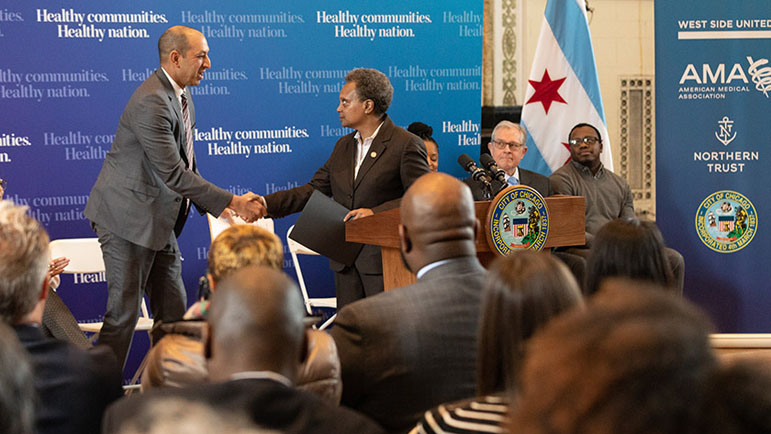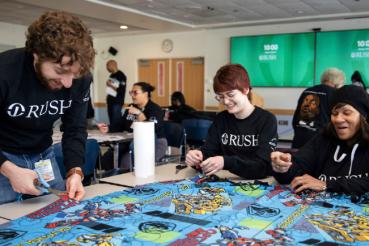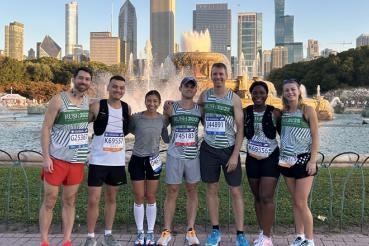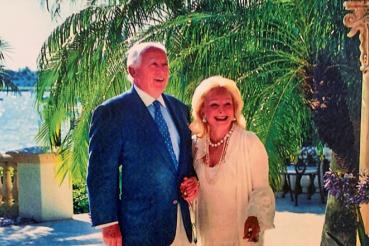The American Medical Association is joining Rush University Medical Center and other Chicago hospitals in allocating a portion of the organizations’ own investment capital for social impact investments — loans that provide both a financial and social return — to help improve the local economic conditions that drive poor health on Chicago’s West Side.
Chicago Mayor Lori Lightfoot, accompanied by Rush and AMA leaders, announced the AMA’s participation at a press conference this morning at Austin Town Hall Cultural Center. The AMA has committed to $2 million in social impact investments over the next two years, furthering an effort that already is providing a national example of how hospitals can use both clinical and business assets to improve community health.
The AMA announced it will make its investments via a loan to a community development financial institution, a private financial institution that helps community development organizations and small businesses in underserved communities gain access to capital often unavailable by traditional lenders. In 2017, Rush committed to make $6 million in these types of loans over three years.
The AMA’s $2 million will be added to the pool of money being invested by West Side United, a nonprofit organization that works to improve health on Chicago’s West Side in collaboration with Rush and other local health care institutions, West Side residents and civic leaders.
“The investments we are making will allow us to improve the health of our residents and to drive quality-of-life improvements for our communities that have long been overlooked,” Lightfoot said. “We thank these partners for responding to our call to action and for playing a crucial role in fostering inclusive economic growth for these communities on the West Side. With new city partners on board, this marks another step forward in my administration's commitment to ensuring community-based health care serving all of our residents, regardless of ZIP code.”

“Hospitals are the economic engines in the communities we serve,” said Rush University Medical Center CEO Dr. Omar Lateef. “With too many small businesses and community organizations excluded from the traditional financial sector, we are proud to have been able to direct a portion of our investment capital to help grow the opportunity the West Side needs.”
Rush’s first social investment makes visible impact
Rush’s first social impact investment in 2017 vividly illustrates the impact such loans can have on the community. A $1 million loan from Rush enabled the Chicago Community Loan Fund to expand its participation in a city of Chicago-led program that acquires abandoned or blighted properties and works with local contractors and community development organizations who build safe, affordable housing for families.
“The challenges we’re seeing on the West Side of Chicago are the result of years of disinvestment,” said Darlene Hightower, Rush University Medical Center’s vice president for community health equity. “Now, very strategically and intentionally, we are starting to provide the investment in properties and people that can help the West Side thrive.”
The Chicago Community Loan Fund partnered with the Safer Foundation, an organization that provides job training for ex-offenders, to develop and sell an abandoned property, providing several people with the opportunity to develop new skills and rebuild their lives. The investments are creating financial pathways for businesses that would otherwise have challenges obtaining a traditional bank loan.
“I run a small, purpose-driven business that turns nuisance properties into real homes for real families,” said Takeisha Washington, who rehabilitates distressed properties and went to CCLF for the financing she found difficult to obtain from traditional banks. They saw the positive impact Washington’s business could have on the neighborhood and how it was the type of return on investment Rush intended.
“This two-flat on West Monroe was a magnet for illegal activity, so the neighbors were thrilled — are thrilled — that I’ve been able to turn this nuisance property into a beautiful, safe, seven bedroom home,” Washington said.
The West Side United collaborative will invest $6 million this year with four community development financial institutions, which will offer loan capital to small West Side businesses and organizations based on the community's needs, such as improving access to affordable housing and healthy foods, financing local business projects, or supporting job creation efforts and educational programs.
Investments will be deployed in the following neighborhoods: Austin, East Garfield Park, West Garfield Park, Belmont Cragin, Humboldt Park, Little Village, Near West Side, West Town, North Lawndale and Pilsen. To date, Rush and other West Side United partners have invested a combined $7.7 million in these neighborhoods.




